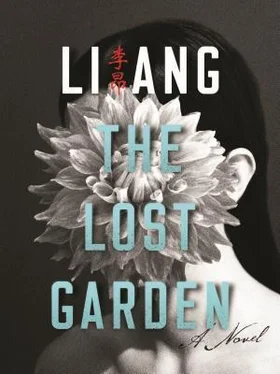When Father wrote this letter, he must have seen flowers from the transplanted star fruit trees flowing down the waterways and reaching into every corner. The tiny teardrops of flowers traveled past pavilions and terraces, through the many ages of the human world and the vicissitudes of life in Lotus Garden.
In addition to planting star fruit trees, Father also cut down the original beech trees on the hill behind Authenticity Study and replaced them with flame trees.
“The ancients planted beech by their study because it portended good luck at the scholars’ examination. Such feudal beliefs are not only outmoded but should be completely eliminated.”
He turned solemn as he spoke:
“If one day democracy can be found in Taiwan, the Taiwanese will have a good life, even if it is the Western or Japanese type, even if it’s just a semblance of democracy, so long as no one holds the idea of a mandate from heaven.”
During the first few years after the transplanting, the flame trees looked rather ordinary, except for the leaves that littered the ground when winter came. The sparse-looking trees in turn brightened up the area near the study, allowing the warm winter sun to slant in and climb up the scrolls on the white walls, where the warmth from the sun remained, then dissipated as it began to set.
“The plane trees were planted so we could see their leaves fall, but the Taiwan coral planes never shed their leaves. Now we have flame trees with fallen leaves in the winter. Wouldn’t you call this one action with multiple results?” Father said laughingly, obviously in high spirits.
When the flame trees began to bloom, the profusion of flowers overshadowed the green leaves, bringing Father a different kind of pleasure. With the onset of summer, the leaves were small, but the buds were already showing their faces, in two shades of red — orange and bright red. As the temperature rose higher and higher, the flame flowers looked as though they had been bathed in fire and were reborn; like the phoenix, they spread their petals and bloomed, cradling the whiskerlike yellow stamens as if ready to soar into the air.
Any two of the flowers, which turned a fiery red with the arrival of each heat wave, could fit in the palm of your hand. Dozens of them formed clusters that hung high up on branches to create fire clouds against the clear blue sky of a summer day.
As the heat lost its intensity, flowers nurtured by the high temperature began to wither, even though it was still the height of summer; soon they would all be gone. But they showed a lingering affection for the world on branches that were now laden with delicate but fully grown leaves, like the tail of a phoenix, swaying and roiling in the wind, and that is how they got their local name: phoenix flowers.
Father was besotted with the flame trees to the point of obsessiveness.
“You can say that flame trees are typically Taiwanese. On an island nation at this latitude, with its high temperatures, the fiery trees are hardy and resilient, just like the Taiwanese, who maintain a fervent heart no matter what setbacks they encounter.” Father continued, “Ayako, you know what I want most is to fill this garden with flame trees and change its name to Phoenix Garden. That would reflect a true Taiwanese flavor, don’t you think? But …”
Naturally, Father never did change the name of the garden. But every year, when the flowers bloomed in early summer, he spent all day under the trees, reading, even napping. She also liked to bring up a stool and sit by his side, still haunted by the fear that he’d abruptly disappear for a long time; then, when he returned, he would stay inside the Flowing Pillow Pavilion for years, not showing his face.
Most of the time, she could not manage to keep watch for long, and soon she’d lean against him and fall into a deep slumber in the lethargic summer air, forcing him to stay in his lounge chair for most of the afternoon. As he lay face up, distance was distorted, giving him the impression that the clusters of fiery red blooms were pressing down on him, filling every inch of his field of vision. By contrast, the azure blue sky of central Taiwan, now visible only through the leaves and flowers, seemed to spread out into the distance. The sky appeared to have never before been so far and so high.
When she was thirteen, Yinghong tested into a provincial girl’s middle school in a town that was a thirty-minute bus ride from Lucheng. With the imminent beginning of the new semester, she had to cut off her long, fine hair and replace it with a uniform haircut that made her look like she was wearing half a watermelon rind. Father and Mother even had a fight over the haircut.
In the summer following the exam, Father began teaching her English, starting with the alphabet, pronunciation, and a few words. In addition, he began telling her about the Zhu ancestors, usually under the flame trees after she woke up from her afternoon nap.
“When we talk about our forebears, the Zhu clan likes to begin with Zhu Jiancheng. Our family lineage record begins with him. Some even say that Zhu was not our surname at first, but was given to us by the Zhu emperor of the Ming dynasty, to share the imperial surname.”
With his eye on the fiery flowers, Father began casually:
“I disagree. I’ve looked through regional and county gazetteers and have found nothing to substantiate such a claim. I believe, fundamentally, that the Zhu family should not have considered it an honor to abandon their original surname and adopt the name of the ruling emperor. You must keep this in mind, Ayako.”
Thirteen-year-old Yinghong had yet to see why it was not a good idea to adopt the emperor’s surname, but she nodded obediently at what her father said.
“There’s also a minor discrepancy in beginning the family lineage record with Zhu Jiancheng, who came to Taiwan during the reign of the Kangxi Emperor and developed Zhuluo County in central Taiwan, where he acquired a large quantity of land and property. One record shows that he harvested thousands of tons of rice to fill his storehouse, thus laying the foundation of the Zhu family fortune, and is deserving of our respect. But why wouldn’t the record go back further to include his ancestors, such as his father or his grandfather? Do you know why, Ayako?”
She shook her head, for she did not understand everything he was saying.
“My speculation is that whoever began the lineage record decided to skip that part because Zhu Jiancheng’s forebears must have done something dishonorable and shameful. As a child, I’ve heard elders whisper among themselves tales of our ancestors having been pirates.”
Delighted by this, she giggled in a crisp voice that retained a hint of girlishness.
“That’s wonderful, Otosan. Pirates! Were they like those in the stories you’ve told me, those who bury treasure on small islands?”
“Maybe,” Father smiled. “I checked all the regional and county gazetteers until I finally discovered someone who may well be the first in our Zhu family to come to Taiwan. His name was Zhu Feng, and he ought to have been Zhu Jiancheng’s grandfather. I went to the Upper House to ask Grand Uncle, who agreed that some people in our clan do accept Zhu Feng as our earliest recorded ancestor.”
Looking at him with her beautiful, big eyes under long lashes, she asked:
“What did he do that was so bad that we have disowned him?”
“He was a pirate who killed and plundered, so it was unavoidable and reasonable that later generations would feel shame.”
Father stared into the distance as he looked at the flowers.
“But we have to take note that Zhu Feng was no small-time pirate,” he went on. “He is mentioned in the county gazetteer, where he is described as a brave, gallant, and righteous person who made great contributions to local development and was praised by later generations. Records also show that he helped smuggle residents from the Hokkien and Canton areas across the Taiwan Straits when the late-Ming government banned immigration to Taiwan. So he obviously wasn’t just a murderous pirate.”
Читать дальше












